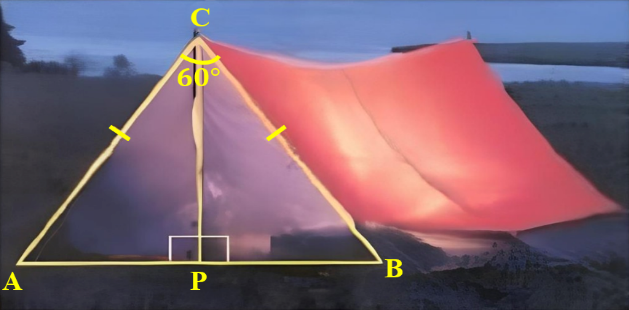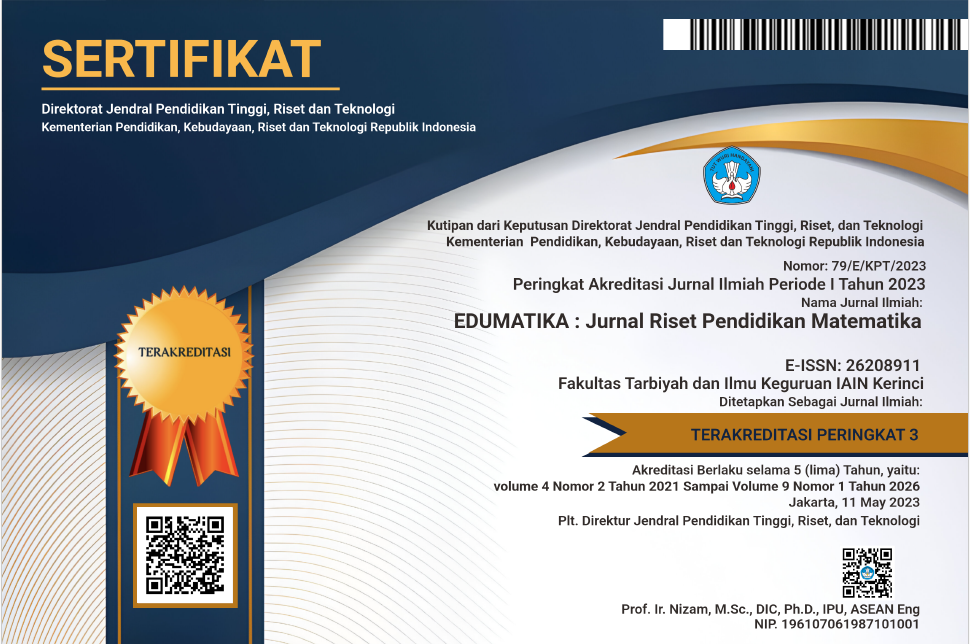The Students' Skills in Solving Mathematics Open-Ended Problems Based on Cognitive Style Backgrounds
Abstract
Differences in students' cognitive styles cause differences in accepting and managing learning and connecting experiences into learning. Differences in students' cognitive styles also cause differences in mathematical problem-solving skills. This research aims to describe students' skills in solving mathematics open-ended problems in terms of differences in cognitive styles, namely Field Independent (FI) and Field Dependent (FD). This research is descriptive qualitative research that involved four eight-grade students at a private junior high school in Sukoharjo, Central Java, Indonesia as subjects who were selected based on differences in cognitive styles. Cognitive style data was collected through a cognitive style questionnaire while students' mathematical problem-solving skills were revealed through tests and interviews. The data was analyzed to identify the fulfillment of indicators of mathematical problem-solving skills according to Polya, which include understanding the problems, preparing plans, implementing plans, and looking back. The results showed that field independent subjects had better mathematical problem solving abilities than field dependent subjects. Field independent subjects fulfill all indicators of mathematical problem-solving skills, while field dependent subjects only fulfill indicators of understanding the problems. This research can be used as a reference in designing learning strategies that suit all students' cognitive styles to improve students' mathematical problem-solving skills.
Downloads
References
Altıntaş, S., & Görgen, İ. (2018). The effects of pre-service teachers’ cognitive styles on learning approaches. International Journal of Evaluation and Research in Education (IJERE), 7(4), 285–293. https://doi.org/10.11591/ijere.v7i4.15737
Anthycamurty, R. C. C., Mardiyana, & Saputro, D. R. S. (2018). Analysis of problem solving in terms of cognitive style. Journal of Physics: Conference Series, 983, 1–4. https://doi.org/10.1088/1742-6596/983/1/012146
Asok, A. N., & Hasanah, A. (2021). Senior high school students’ mathematical problem solving of three-variable linear equation system. JTAM (Jurnal Teori Dan Aplikasi Matematika), 5(1), 254–261. https://doi.org/10.31764/jtam.v5i1.3929
Azzahra, R. H., & Pujiastuti, H. (2020). Analisis kemampuan pemecahan masalah siswa pada materi sistem persamaan linear tiga variabel. Transformasi : Jurnal Pendidikan Matematika Dan Matematika, 4(1), 153–162. https://doi.org/10.36526/tr.v4i1.876
Becker, J. P., & Epstein, J. (2006). The “open approach” to teaching school mathematics. Journal of the Korea Soeciety of Mathematical Education Series D: Research in Mathematical Education, 10(3), 151–167. https://koreascience.kr/article/JAKO200634742893766.pdf
Çakır, H., & Cengiz, Ö. (2016). The use of open ended versus closed ended questions in turkish classrooms. Open Journal of Modern Linguistics, 06(02), 60–70. https://doi.org/10.4236/ojml.2016.62006
Cresswell, C., & Speelman, C. P. (2020). Does mathematics training lead to better logical thinking and reasoning? A cross-sectional assessment from students to professors. PLOS ONE, 15(7), 1–21. https://doi.org/10.1371/journal.pone.0236153
Daniels, H. L. (1996). Interaction of Cognitive Style and Learner Control of Presentation Mode in a Hypermedia Environment [Virginia Tech]. https://vtechworks.lib.vt.edu/items/4d0336db-3433-4045-904f-1e02420b5dcd
Faizah, H. (2022). Analisis pemecahan masalah matematika berbentuk soal cerita pada materi SPLDV ditinjau dari gaya kognitif. Jurnal Ilmiah Soulmath : Jurnal Edukasi Pendidikan Matematika, 10(2), 177–194. https://doi.org/10.25139/smj.v10i2.4820
Fauzy, A., & Nurfauziah, P. (2021). Kesulitan pembelajaran daring matematika pada masa pandemi Covid-19 di SMP Muslimin Cililin. Jurnal Cendekia : Jurnal Pendidikan Matematika, 5(1), 551–561. https://doi.org/10.31004/cendekia.v5i1.514
Hansen, K., & Świderska, A. (2023). Integrating open- and closed-ended questions on attitudes towards outgroups with different methods of text analysis. Behavior Research Methods, 56(5), 4802–4822. https://doi.org/10.3758/s13428-023-02218-x
Hasbullah, H., & Sajiman, S. U. (2020). The differences of cognitive style fields-independent and dependent on students’ mathematical problem solving abilities. AKSIOMA: Jurnal Program Studi Pendidikan Matematika, 9(2), 387–394. https://doi.org/10.24127/ajpm.v9i2.2778
Kusumawati, V. G., & Andriyani, A. (2020). The group embedded figure and pattern test for cognitive styles of deaf-mute students. International Journal on Education Insight, 1(2), 69–76. https://doi.org/10.12928/ijei.v1i2.2769
Maarif, S., Umam, K., Febriantoni, F., & Slamet, S. (2022). Bagaimana kemampuan pemecahan masalah barisan dan deret ditinjau dari gaya kognitif siswa. AKSIOMA: Jurnal Program Studi Pendidikan Matematika, 11(4), 3492–3501. https://doi.org/10.24127/ajpm.v11i4.6063
Miles, M. B., & Huberman, A. M. (1994). Qualitative Data Analysis: An Expanded Sourcebook. SAGE Publications. https://books.google.co.id/books?id=U4lU_-wJ5QEC&printsec=frontcover&hl=id#v=onepage&q=reduction&f=false
Mirlanda, E. P., Nindiasari, H., & Syamsuri, S. (2020). Pengaruh pembelajaran flipped classroom terhadap kemampuan penalaran matematis ditinjau dari gaya kognitif siswa. Prima: Jurnal Pendidikan Matematika, 4(1), 11–21. https://doi.org/10.31000/prima.v4i1.2081
Muyassaroh, K. A., & Masduki, M. (2023). Profil berpikir aljabar siswa dalam menyelesaikan permasalahan generalisasi dan berpikir dinamis ditinjau dari gaya kognitif FI-FD. FIBONACCI: Jurnal Pendidikan Matematika Dan Matematika, 9(1), 27–42. https://doi.org/10.24853/fbc.9.1.27-42
OECD. (2023a). PISA 2022 Results (Volume I). OECD. https://doi.org/10.1787/53f23881-en
OECD. (2023b). PISA 2022 Results (Volume I and II): Country Notes. https://www.oecd.org/en/publications/2023/11/pisa-2022-results-volume-i-and-ii-country-notes_2fca04b9/indonesia_0e09c072.html
Polya, G. (1973). How To Solve It: A New Aspect of Mathematical Method. Princeton University Press. https://math.hawaii.edu/home/pdf/putnam/PolyaHowToSolveIt.pdf
Rambe, A. Y. F., & Afri, L. D. (2020). Analisis kemampuan pemecahan masalah matematis siswa dalam menyelesaikan soal materi barisan dan deret. AXIOM : Jurnal Pendidikan Dan Matematika, 9(2), 175–187. https://doi.org/10.30821/axiom.v9i2.8069
Rogers, M. L., Tucker, R. P., Law, K. C., Bauer, B. W., Smith, C. E., Capron, D. W., Anestis, M. D., & Joiner, T. E. (2019). The relationship between negative cognitive styles and lifetime suicide attempts is indirect through lifetime acute suicidal affective disturbance symptoms. Cognitive Therapy and Research, 43(2), 354–364. https://doi.org/10.1007/s10608-018-9968-8
Rosmaiyadi, R., & Husna, N. (2020). Ability of mathematical problem solving on junior high school students with field dependent cognitive learning style. Math Didactic: Jurnal Pendidikan Matematika, 6(2), 198–211. https://doi.org/10.33654/math.v6i2.917
Sarwanto, S., Fajari, L. E. W., & Chumdari, C. (2021). Open-ended questions to assess critical-thinking skills in Indonesian elementary school. International Journal of Instruction, 14(1), 615–630. https://doi.org/10.29333/iji.2021.14137a
Septian, A., Widodo, S. A., Afifah, I. N., Nisa, D. Z., Putri, N. P. K., Tyas, M. D., Nisa, R. H., & Andriani, A. (2022). Mathematical problem solving ability in Indonesia. Journal of Instructional Mathematics, 3(1), 16–25. https://doi.org/10.37640/jim.v3i1.1223
Sintawati, M., & Mardati, A. (2023). Kemampuan Berpikir dalam Pembelajaran Matematika. K-Media.
Slameto. (2015). Belajar dan Faktor-faktor yang Memengaruhinya. Rineka Cipta.
Solihin, R. R., Susanto, T. T. D. , Fauziyah, E. P., Yanti, N. V. I., & Ramadhania, A. P. (2024). The efforts of indonesian government in increasing teacher quality based on PISA result In 2022: A literature review. Perspektif Ilmu Pendidikan, 38(1), 57–65. https://doi.org/10.21009/PIP.381.6
Wasiah, U. (2021). Analisis kesulitan belajar matematika siswa SMP dalam pembelajaran daring pada masa pandemi Covid-19. Jurnal Pendidikan Matematika Universitas Lampung, 9(3), 307–317. https://doi.org/10.23960/mtk/v9i3.pp307-317
Widdah, H., & Setiawan, Y. E. (2023). Analisis kemampuan pemecahan masalah matematis ditinjau dari motivasi belajar matematika siswa. AKSIOMA: Jurnal Program Studi Pendidikan Matematika, 12(2), 2641–2650. https://doi.org/10.24127/ajpm.v12i2.7113
Witkin, H. A., & Goodenough, D. R. (1981). Cognitive styles: essence and origins. Field dependence and field independence. Psychological Issues, 51, 1–141. https://pubmed.ncbi.nlm.nih.gov/7012884/
Witkin, H. A., Moore, C. A., Goodenough, D., & Cox, P. W. (1977). Field-dependent and field-independent cognitive styles and their educational implications. Review of Educational Research, 47(1), 1–64. https://doi.org/10.3102/00346543047001001
Yuliyani, D. R., & Setyaningsih, N. (2022). Kemampuan literasi matematika dalam menyelesaikan soal berbasis PISA konten change and relationship ditinjau dari gaya kognitif siswa. EDUKATIF : Jurnal Ilmu Pendidikan, 4(2), 1836–1849. https://doi.org/10.31004/edukatif.v4i2.2067

Copyright (c) 2024 Putri Syarifatul Ulya, Nining Setyaningrum

This work is licensed under a Creative Commons Attribution 4.0 International License.














